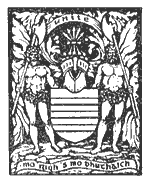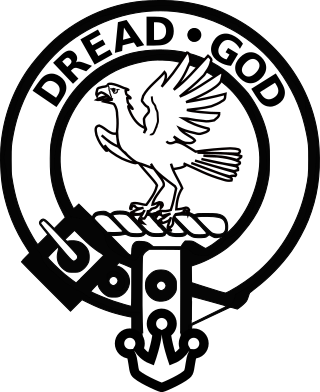
Robert Roy MacGregor was a Scottish outlaw, who later became a folk hero.

Clan Maclaine of Lochbuie is a Scottish Clan that inhabited lands on the southern end of the Isle of Mull in the Inner Hebrides of the western Scottish Highlands. "Maclaine" is an alternate spelling for "McLean." Clan Maclaine of Lochbuie and Clan Maclean of Duart are two separate clans. However, the two clans share a strong family connection. The 26th clan chief is The Much Honoured Lorne Gillean Ian Maclaine of Lochbuie, Baron of Moy. The clan is recognized by both the Standing Council of Scottish Chiefs and the Lord Lyon.

Clan Mackintosh is a Scottish clan from Inverness in the Scottish Highlands. The chiefs of the clan are the Mackintoshes of Mackintosh. Another branch of the clan, the Mackintoshes of Torcastle, are the chiefs of Clan Chattan, a historic confederation of clans.

Clan Grant is a Highland Scottish clan.

Clan Cameron is a West Highland Scottish clan, with one main branch Lochiel, and numerous cadet branches. The Clan Cameron lands are in Lochaber and within their lands lies Ben Nevis which is the highest mountain in the British Isles. The Chief of the clan is customarily referred to as simply "Lochiel".

The Battle of Mulroy was a Scottish clan battle fought in August 1688 in the Lochaber district of Scotland. It was fought between the Clan Mackintosh who were supported by government troops under Kenneth Mackenzie of Suddie against the Clan MacDonald of Keppoch who were supported by the Clan Cameron over disputed lands in the Braes of Lochaber. The battlefield has been inventoried and protected by Historic Scotland under the Scottish Historical Environment Policy of 2009.

The Battle of Glenlivet was a Scottish clan battle fought on 3 October 1594 near Glenlivet, Moray, Scotland. It was fought between Protestant forces loyal to King James VI of Scotland who were commanded by Archibald Campbell, 7th Earl of Argyll, against Catholic forces who were commanded by George Gordon, 6th Earl of Huntly, and Francis Hay, 9th Earl of Erroll. The Catholics won a decisive victory in the battle, but in the aftermath were subdued by King James.

Clan MacDonald of Keppoch, also known as Clan MacDonellof Keppoch or Clan Ranald of Lochaber, is a Highland Scottish clan and a branch of Clan Donald. The progenitor of the clan is Alistair Carrach MacDonald, 4th great-grandson of the warrior Somerled. The clan chief is traditionally designated as the "Son of Ranald's son".
The Clan MacDonald of Lochalsh was a Scottish family and a branch of the larger Clan Donald.

The Battle of Glen Fruin was a Scottish clan battle fought on 7 February 1603 between the Clan Gregor and its allies on one side, and the Clan Colquhoun and its allies on the other. The Clan Gregor and Clan Colquhoun were at feud due to the MacGregors carrying out raids on the Colquhoun's lands. The Colquhouns gained royal support and raised an army against the MacGregors. However, during the subsequent battle of Glen Fruin, the Colquhouns were comprehensively defeated. Glen Fruin is in the Loch Lomond area, in the county of Dunbartonshire, Scotland. In the aftermath of the battle royal policy punished the MacGregors for 150 years.

The Battle of Achnashellach was a Scottish clan battle said to have taken place in the year 1505, in the Scottish Highlands at Achnashellach. It was fought by the Clan Cameron against the Clan Mackay and the Clan Munro.

Donald Cameron lived in the Scottish Highlands during the reign of Mary, Queen of Scots. Born illegitimate, his father was Ewen Cameron of Lochiel, 14th chief of Clan Cameron, and his mother was the daughter of the chief of Clan MacDougall. Donald Cameron is claimed as the eponymous ancestor of the Taylor sept of Clan Cameron. He is alluded to in the coat of arms of the chief of Clan Cameron, as a likeness of him appears as the supporters holding a Lochaber axe.

The Battle of Drumlui was a Scottish clan battle that took place in either 1330 or 1337, in the Scottish Highlands between the Clan Cameron and the Clan Mackintosh.

Sir Lachlan Maclean, 1st Baronet of Morvern, the 17th Clan Chief of Clan Maclean. Lachlan was granted his Baronet title by Charles I and he became the Clan Chief on the death of his brother in 1626. He fought as a Royalist under James Graham, 1st Marquess of Montrose during the Wars of the Three Kingdoms at the Battle of Inverlochy, Battle of Auldearn and Battle of Kilsyth. From 1628 to 1633 he sat in the Parliament of Scotland as shire commissioner for Tarbert. From his rule onward, all Maclean clan chiefs are successive Baronets of Movern.

Clan Munro is a Highland Scottish clan. Historically the clan was based in Easter Ross in the Scottish Highlands. Traditional origins of the clan give its founder as Donald Munro who came from the north of Ireland and settled in Scotland in the eleventh century, though its true founder may have lived much later. It is also a strong tradition that the Munro chiefs supported Robert the Bruce during the Wars of Scottish Independence. The first proven clan chief on record however is Robert de Munro who died in 1369; his father is mentioned but not named in a number of charters. The clan chiefs originally held land principally at Findon on the Black Isle but exchanged it in 1350 for Estirfowlys. Robert's son Hugh who died in 1425 was the first of the family to be styled "of Foulis", despite which clan genealogies describe him as 9th baron.

The Battle of Craig Cailloch was a Scottish clan battle fought in 1441 between the Clan Cameron and Clan Mackintosh. The two clans had defected from Alexander of Islay, Earl of Ross during his war with James I of Scotland. Alexander lost the war but was subsequently appointed Justiciar of Scotia by James and became reconciled to the Chattans. Alexander encouraged the Chattans to invade the lands of the Camerons which resulted in a battle on Craig Cailloch in 1441. The battle was bloody and several leading Chattan men were killed. Afterwards Malcolm Mackintosh led further raids into Cameron territory to avenge the deaths. Donald Dubh, leader of the Camerons was later forced into exile in Ireland.
The Independent Highland Companies were irregular militia raised from the Scottish clans of the Scottish Highlands by order of the Government between 1603 and 1760 in order to help keep the peace and enforce the law in the Highlands and were recognized as such by the Government. The officers of the Independent Highland Companies were commissioned as officers of the British Army but the Independent Companies were not recognized as official regiments of the line of the army. The Independent Highland Companies were the progenitors of the Highland Regiments of the British Army that began when ten Independent Highland Companies were embodied to form the Earl of Crawford's Highland Regiment that was numbered the 43rd Regiment of Foot in 1739.

The Raid on Rannoch took place in 1753 in the tumultuous aftermath of the Jacobite rising of 1745. Lieutenant Hector Munro, 8th laird of Novar who was a commissioned officer in the 34th (Cumberland) Regiment of Foot led the raid to capture the Jacobite rebel John Dubh Cameron who was later executed.
The Dewar Manuscripts are a collection of oral folktales of the Scottish Highlands, recorded in writing between 1863 and 1871 by John Dewar. Dewar's writings were first translated from Gaelic to English in 1879 and since then have been published in multiple formats. The collection of the folktales was intended to ensure that they were not forgotten by the population of the Scottish Highlands, and the manuscripts serve today as both a cultural record and historical source.

The Raids of Urquhart were two raids carried out in the vicinity of Urquhart Castle in the Scottish Highlands in October 1544 and April 1545 where a large amount of cattle, horses, harvest, furniture and military equipment were stolen from the Clan Grant, a Highland Scottish clan, by the Clan Cameron and Clan MacDonell of Glengarry, both also Scottish Highland clans.

















